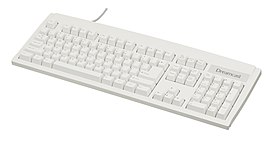
Back سيجا نت Arabic سيجا نت ARZ SegaNet Spanish SegaNet French SegaNet ID SegaNet Italian SegaNet Portuguese SegaNet Russian
The Dreamcast is a home video game console by Sega, the first one introduced in the sixth generation of video game consoles. With the release of the Dreamcast in 1998 amid the dot-com bubble and mounting losses from the development and introduction of its new home console, Sega made a major gamble in attempting to take advantage of the growing public interest in the Internet by including online capabilities in the console as a selling point. As such, the Dreamcast was the first console to include a built-in modem for Internet support and online play.[note 1] Sega would end up leaning heavily into the online capabilities to sell the Dreamcast as hype grew for Sony's then-upcoming competitor, the PlayStation 2, which also promised online gaming in addition to its DVD capabilities.
To create further incentive for use of the Dreamcast's online capabilities, Sega went beyond the scope of their prior online ventures and invested heavily in the development of unified online services for it, a concept that predated former partner Microsoft's Xbox Live service by a few years. Sega also predated Microsoft in pioneering the concept of downloadable content for games released on a console, though it was hampered by the small memory of the VMU. Despite the foresight Sega had in the emergence of broadband Internet access by making the modem modular and upgradeable with a broadband adapter, the services mainly supported dial-up Internet access throughout their lifetimes; only in Japan did broadband service arrive for the Dreamcast before Sega discontinued it in 2001, abandoning the console business altogether with its transition to third-party publishing. The services were gradually discontinued by Sega in the subsequent years; the last remaining service lingered on in Japan before it was shut down in 2007. In response, hobbyists have revived parts of the online services by creating private servers for a handful of games that had their official servers shut down.
- ^ Moss, Richard (March 24, 2018). "The Mac gaming console that time forgot". Ars Technica. Archived from the original on April 9, 2021. Retrieved October 24, 2021.
- ^ Pollack, Andrew (March 14, 1996). "Is Pippin a Breakthrough or Outmoded on Arrival?". The New York Times. p. D1. Archived from the original on October 24, 2021. Retrieved October 24, 2021.
Cite error: There are <ref group=note> tags on this page, but the references will not show without a {{reflist|group=note}} template (see the help page).
© MMXXIII Rich X Search. We shall prevail. All rights reserved. Rich X Search

